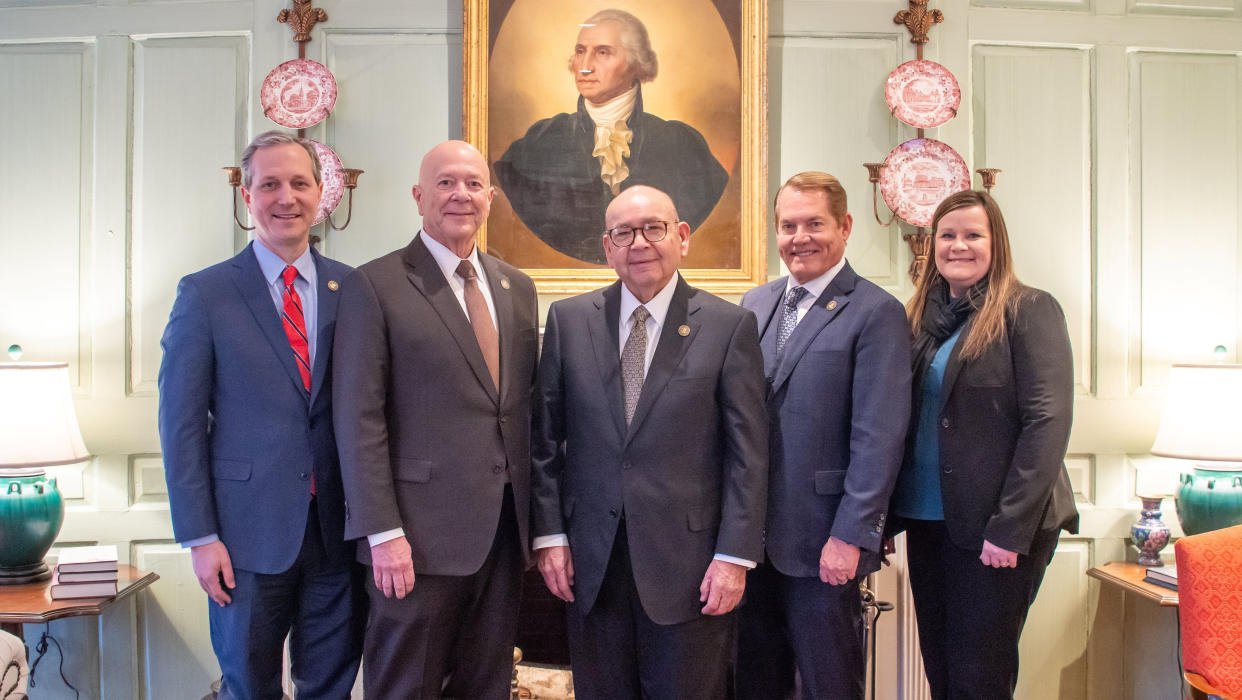Chickasaw Nation Governor Bill Anoatubby Shares Tribe’s Health Care Transformation with Harvard Audience

- Oops!Something went wrong.Please try again later.
Chickasaw Nation Governor Bill Anoatubby spoke at Harvard Medical School Jan. 18, detailing the connection between leadership and health care in medically underserved communities.
During the Leadership and Health Care Transformation in Medically Underserved Communities forum, Governor Anoatubby shared the Chickasaw Nation’s decades-long journey toward greater health equity for Chickasaws and other First Americans it serves.
“The Chickasaw Nation’s journey in transforming health care serves as a powerful example of what can be achieved through dedicated leadership, strategic planning and an unwavering commitment to the people you serve,” he said.
Governor Anoatubby placed health care for the Chickasaw people into historical context, including Removal and treaties with the federal government which guaranteed protection, rights to self-governance, financial support and health care from the United States government.
“Our ancestors laid the foundations for our future, making sacrifices and taking steps whose benefits they knew they might never see themselves. This is the essence of true leadership and service – to love the people you serve and to envision and work toward a future that you may never witness, but one that will shape the lives of generations to come,” he said.
For many years in the Chickasaw Nation, access to basic health care was limited. Indian Health Service (IHS) facilities were hundreds of miles away in Lawton and Talihina, Oklahoma. Governor Anoatubby said health care disparities and the lack of access became clear when he accepted the role of the Chickasaw Nation’s first health director in 1975.
By that time, IHS had established three small clinics within the Chickasaw Nation, and staff split their time between the clinics.
“The need for adequate health care in the Chickasaw Nation was so immense – so critical – it is difficult to describe. It became increasingly clear to me that health care for First Americans was a historically and socioeconomically complicated issue that touched on nearly every aspect of our people’s lives.”
Following years of work by Chickasaw Nation leaders in collaboration with U.S. Rep. Carl Albert, the Carl Albert Indian Health Facility, named in his honor, began serving patients June 14, 1980. At that time, it was estimated it would serve between 20,000-30,000 patients annually.
“But we quickly learned that we would serve far more than that number,” Governor Anoatubby said.
“It had become apparent that we needed a multifaceted, all-encompassing set of small-scale, incremental solutions to overcome such a long history of health and economic inequality. Understanding this, we directed our efforts not only toward providing medical services but also toward mitigating the effects of these social drivers.”
To achieve these goals, an ambitious and holistic mission, “To enhance the overall quality of life of the Chickasaw people,” was developed.
“This mission became the driving force behind all of our decisions from this point on and led us to develop our own service-based solutions,” he said.
Economic enterprises and investments in new and existing businesses were made to stimulate growth, and develop and fund new programs and services for Chickasaw citizens.
In 1987, the Chickasaw Nation had only a couple of businesses, employed approximately 250 people and had an operating budget of less than $11 million.
Today, the Chickasaw Nation operates more than 100 businesses in a range of diverse sectors, including health care, energy, media, manufacturing, defense, technology, retail, hospitality, tourism and more.
Nearly 14,000 workers are employed by the Chickasaw Nation, and government and business activities support more than 34,000 jobs, paying $1.8 billion in wages and benefits to Oklahoma workers.
In 1994, the Chickasaw Nation became one of the first tribes in the U.S. to compact with IHS to assume administration of health care services, marking a turning point in health care delivery to First Americans.
“With this compact, we did more than just take responsibility of our own health care system, we took control of our tribe’s destiny, as this was a major leap forward in reasserting our sovereignty and enhancing our ability to self-govern,” Governor Anoatubby explained.
A few years later, tribal funds were invested to construct a new health facility utilizing the IHS Joint Venture Funding Program.
By 2010, the 370,000-square-foot, state-of-the-art Chickasaw Nation Medical Center was providing the highest quality health care to patients. Three additional clinics were constructed in Ardmore, Purcell and Tishomingo through the joint venture program. Additionally, the Chickasaw Nation Department of Health is planning for expansion of services throughout the tribal boundaries.
Using diplomacy, forming partnerships, the resilience of the Chickasaw people and self-determination have all played vital roles in achieving initiatives, goals and milestones in the health journey, Governor Anoatubby said.
Decades of hard work have resulted in increased health services, as well as quality programs to address related health determinants, including nutrition, transportation, physical fitness, mental wellness and many others.
“By fostering environments of mutual respect, understanding and collaboration, we not only uplift Chickasaws and other First Americans but also everyone living in our communities and many across our state and region.”
Following the Governor’s address, Dr. Charles Grim, Chickasaw Nation Secretary of Health, was included on a panel of health care providers, leaders and policymakers who discussed their experiences and the strategies to work toward a healthier America.
The symposium was organized by Harvard Medical School Center for Primary Care, Massachusetts General Hospital, Boston Public Health Commission and the Chickasaw Nation.
The audience consisted of Harvard Medical School students, professors and health care leaders.

